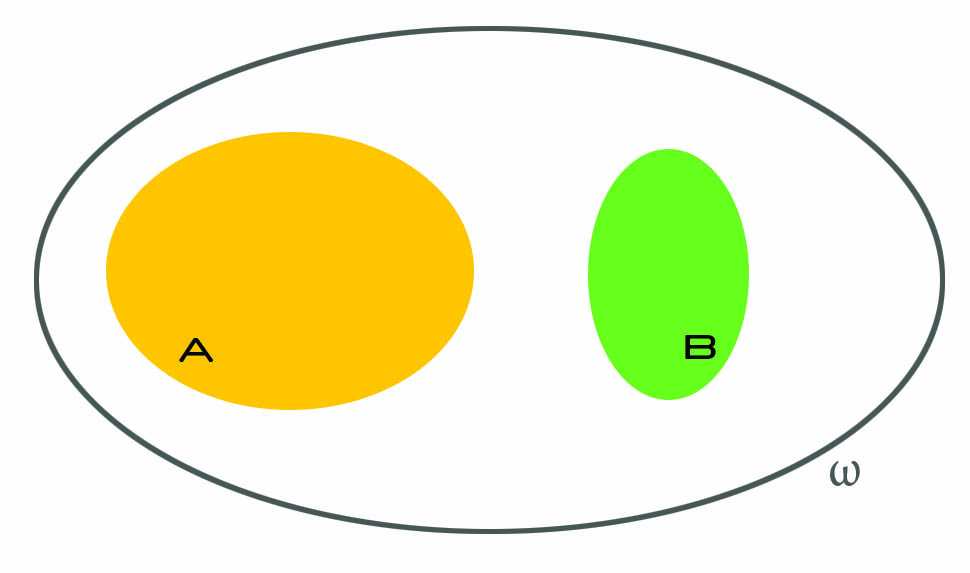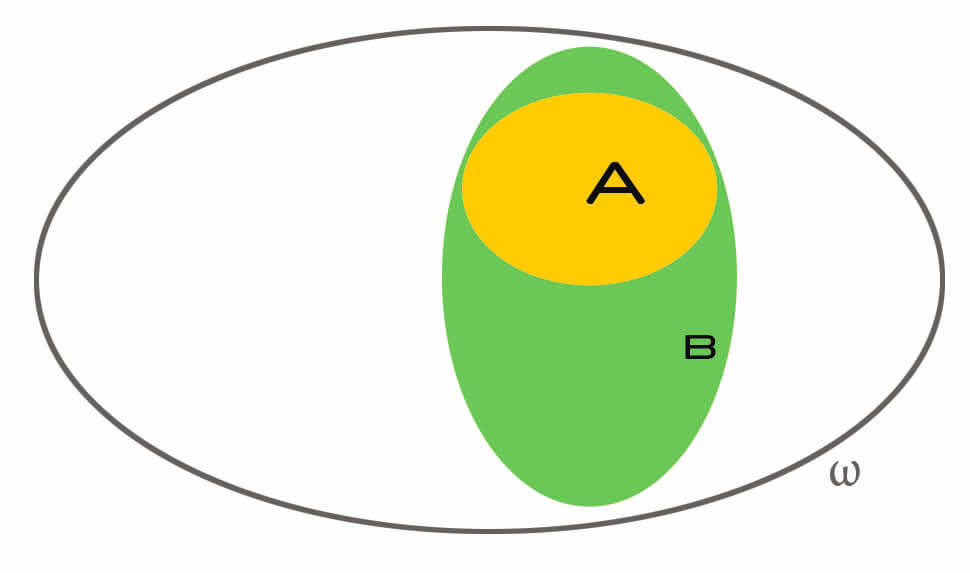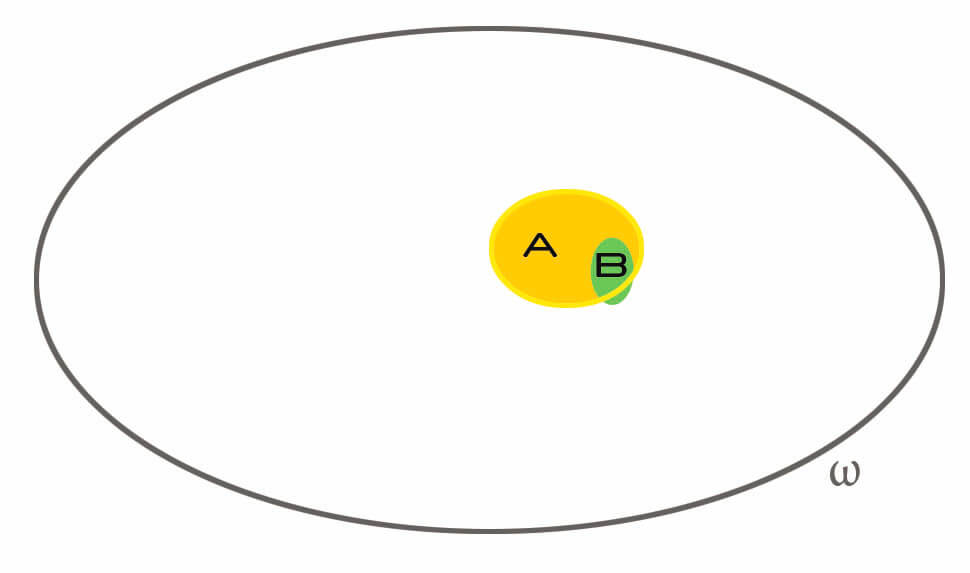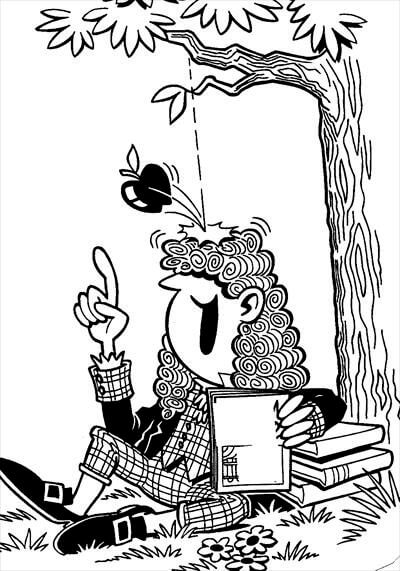So, you want to calculate the probability of an event knowing that another has happened. There is a formula for that, it is called conditional probability, but why is it the way it is? Let’s first write down the definition of conditional probability:
![]()
We need to wonder: what does the happening of event ![]() tell about the odds of happening of event
tell about the odds of happening of event ![]() ? How much more likely
? How much more likely ![]() becomes if
becomes if ![]() happens? Think in terms of how
happens? Think in terms of how ![]() affects
affects ![]() .
.
If ![]() and
and ![]() are independent, then knowing something about B will not tell us anything at all about
are independent, then knowing something about B will not tell us anything at all about ![]() , at least not that we did not know already. In this case
, at least not that we did not know already. In this case ![]() is empty and thus
is empty and thus ![]() . This makes sense! In fact, consider this example: how does me buying a copybook affects the likelihood that your grandma is going to buy a frying pan? It does not: the first event has no influence on the second, thus the conditional probability is just the same as the normal probability of the first event.
. This makes sense! In fact, consider this example: how does me buying a copybook affects the likelihood that your grandma is going to buy a frying pan? It does not: the first event has no influence on the second, thus the conditional probability is just the same as the normal probability of the first event.

If ![]() and
and ![]() are not independent, several things can happen, and that is where things get interesting. We know that B happened, and we should now think as if
are not independent, several things can happen, and that is where things get interesting. We know that B happened, and we should now think as if ![]() was our whole universe. The idea is: we already know what are the odds of
was our whole universe. The idea is: we already know what are the odds of ![]() , right? It is just
, right? It is just ![]() . But how do they increase if we know that we do not really have to consider all possible events, but just a subset of them? As an example, think of
. But how do they increase if we know that we do not really have to consider all possible events, but just a subset of them? As an example, think of ![]() versus
versus ![]() knowing that all balls are red. This makes a huge difference, right? (As an aside, that is what we mean when we say that probability is a measure of our ignorance.)
knowing that all balls are red. This makes a huge difference, right? (As an aside, that is what we mean when we say that probability is a measure of our ignorance.)
So anyway, now we ask: what is the probability of ![]() ? Well, it would just be
? Well, it would just be ![]() , but we must account for the fact that we now live inside
, but we must account for the fact that we now live inside ![]() , and everything that is outside it is as if it did not existed. So
, and everything that is outside it is as if it did not existed. So ![]() actually becomes
actually becomes ![]() : we only care about the part of
: we only care about the part of ![]() that is inside
that is inside ![]() , because that is where we live now.
, because that is where we live now.
But, there is a caveat. We are thinking as if ![]() was the whole universe but, in terms of probabilities, it actually is not, because nobody has informed the probability distribution. In fact, we compute
was the whole universe but, in terms of probabilities, it actually is not, because nobody has informed the probability distribution. In fact, we compute ![]() precisely because we still live in the bigger universe, but we need to account for the fact that
precisely because we still live in the bigger universe, but we need to account for the fact that ![]() is our real universe now. That is why we need a re-scaling factor: something that will scale
is our real universe now. That is why we need a re-scaling factor: something that will scale ![]() to make it numerically correct, to account for the fact that
to make it numerically correct, to account for the fact that ![]() is our current universe. This is what the
is our current universe. This is what the ![]() at the denominator does.
at the denominator does.
In fact, the factor ![]() accounts for how much relevant the information that
accounts for how much relevant the information that ![]() happened is. If
happened is. If ![]() , it means that, for probability purposes,
, it means that, for probability purposes, ![]() – the switch of universe was just apparent! A further consequence is that
– the switch of universe was just apparent! A further consequence is that ![]() , because
, because ![]() is basically inside
is basically inside ![]() (apart from silly null-measure caveats). In turn, this has the consequence of making
(apart from silly null-measure caveats). In turn, this has the consequence of making ![]() . This makes sense: if
. This makes sense: if ![]() is sure to happen, then what does it tell us about the odds of something else? As an example, if we are considering strings of digits (
is sure to happen, then what does it tell us about the odds of something else? As an example, if we are considering strings of digits (![]() ), what is the likelihood that a certain string is made of ones or twos, knowing that it is made out of digits (
), what is the likelihood that a certain string is made of ones or twos, knowing that it is made out of digits (![]() )? It sounds tautological, and it certainly is.
)? It sounds tautological, and it certainly is.
What about a ![]() that is big, yet
that is big, yet ![]() ? This is trickier, as it mostly depends on the interplay between
? This is trickier, as it mostly depends on the interplay between ![]() and
and ![]() . But you are not on a university level website to read about inverse proportionality, are you?
. But you are not on a university level website to read about inverse proportionality, are you?
Another case worth inspection is when ![]() . In that case,
. In that case,
![]()

Makes sense, right? If ![]() happened, and
happened, and ![]() is inside it, then clearly
is inside it, then clearly ![]() must happen as well. If I bought a red umbrella, what are the odds that I bought a generic umbrella as a consequence? Full, yep.
must happen as well. If I bought a red umbrella, what are the odds that I bought a generic umbrella as a consequence? Full, yep.
Finally, let’s consider the case in which ![]() is very small. Suppose that
is very small. Suppose that ![]() and
and ![]() . An
. An ![]() at the denominator will make the resulting fraction become significantly bigger.
at the denominator will make the resulting fraction become significantly bigger.

The idea here is that if ![]() is very narrow, if it talks about something very unlikely, and it happened, this greatly influences the overall conditional probability. What are the odds that I get hospitalized in Japan as a 25 years old man? Very low. What are the odds that today there is an earthquake in Japan? Very low. What are the odds that I get hospitalized in Japan, knowing that today an earthquake happened? Quite high. That’s the idea: the more
is very narrow, if it talks about something very unlikely, and it happened, this greatly influences the overall conditional probability. What are the odds that I get hospitalized in Japan as a 25 years old man? Very low. What are the odds that today there is an earthquake in Japan? Very low. What are the odds that I get hospitalized in Japan, knowing that today an earthquake happened? Quite high. That’s the idea: the more ![]() is unlikely, the higher
is unlikely, the higher ![]() tends to be. In a sense, the more narrow
tends to be. In a sense, the more narrow ![]() is, the higher the amount of information it brings knowing that it happened.
is, the higher the amount of information it brings knowing that it happened.
